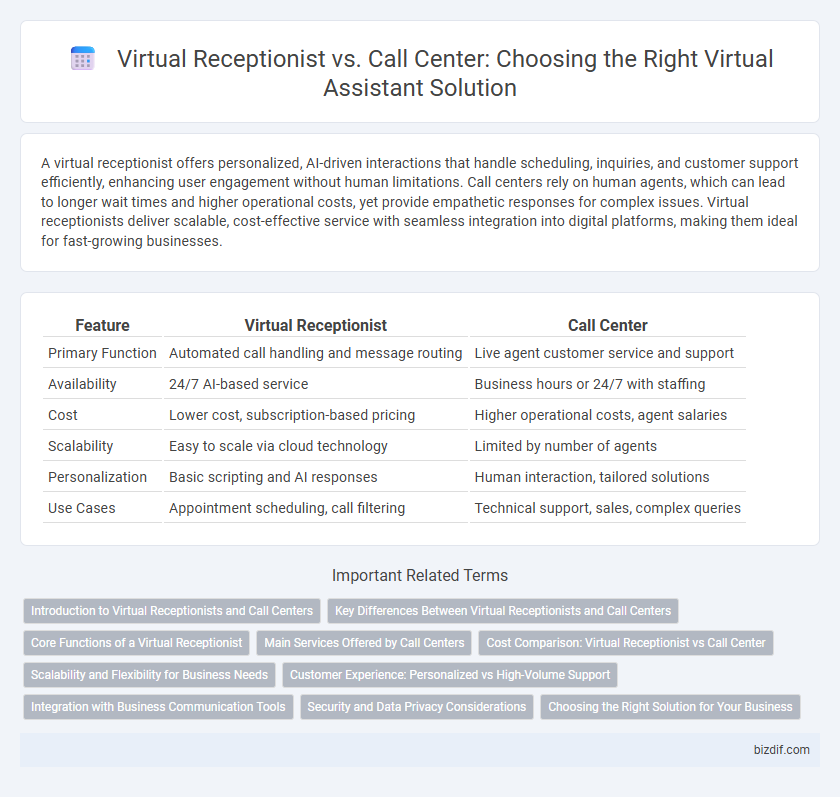A virtual receptionist offers personalized, AI-driven interactions that handle scheduling, inquiries, and customer support efficiently, enhancing user engagement without human limitations. Call centers rely on human agents, which can lead to longer wait times and higher operational costs, yet provide empathetic responses for complex issues. Virtual receptionists deliver scalable, cost-effective service with seamless integration into digital platforms, making them ideal for fast-growing businesses.
Table of Comparison
| Feature | Virtual Receptionist | Call Center |
|---|---|---|
| Primary Function | Automated call handling and message routing | Live agent customer service and support |
| Availability | 24/7 AI-based service | Business hours or 24/7 with staffing |
| Cost | Lower cost, subscription-based pricing | Higher operational costs, agent salaries |
| Scalability | Easy to scale via cloud technology | Limited by number of agents |
| Personalization | Basic scripting and AI responses | Human interaction, tailored solutions |
| Use Cases | Appointment scheduling, call filtering | Technical support, sales, complex queries |
Introduction to Virtual Receptionists and Call Centers
Virtual receptionists offer personalized call handling services using advanced AI technology to manage appointments, route calls, and provide customer support efficiently. Call centers typically handle high-volume inbound and outbound calls with teams of agents focusing on sales, support, and telemarketing tasks. Virtual receptionists provide cost-effective, scalable solutions tailored for small to mid-sized businesses, while call centers cater to larger enterprises requiring extensive customer interaction capabilities.
Key Differences Between Virtual Receptionists and Call Centers
Virtual receptionists provide personalized, real-time customer interaction using AI and live agents to manage calls, appointments, and messages, enhancing business efficiency and customer experience. Call centers handle high volumes of inbound and outbound calls, often specializing in sales, support, or telemarketing with a larger team and structured scripts. Key differences include the level of personalization, scalability, and cost-effectiveness, with virtual receptionists offering tailored services for small to medium businesses, while call centers cater to extensive customer service operations.
Core Functions of a Virtual Receptionist
A virtual receptionist primarily manages inbound calls, appointment scheduling, and basic customer inquiries, offering personalized and immediate support. Unlike call centers that handle high call volumes with large teams, virtual receptionists provide tailored interactions using AI or live agents to enhance customer experience. Core functions include call screening, message taking, and contact information management, streamlining client communication efficiently.
Main Services Offered by Call Centers
Call centers primarily offer services such as inbound and outbound customer support, telemarketing, technical assistance, and order processing. These centers handle high volumes of calls, providing personalized interaction through trained agents who resolve inquiries and troubleshoot issues effectively. They also conduct customer surveys and follow-ups to enhance client engagement and satisfaction.
Cost Comparison: Virtual Receptionist vs Call Center
Virtual receptionists typically offer lower operational costs compared to traditional call centers due to reduced overhead expenses such as office space and equipment. Call centers often require higher staffing levels and infrastructure investments, leading to increased monthly fees and longer contract commitments. Businesses seeking budget-friendly communication solutions can benefit from the scalable pricing and flexible plans provided by virtual receptionist services.
Scalability and Flexibility for Business Needs
Virtual receptionists offer unparalleled scalability and flexibility by handling fluctuating call volumes without the need for additional on-site staff, adapting instantly to business demands. Call centers typically require more fixed resources and infrastructure, making rapid scaling costly and complex for fluctuating workloads. Businesses seeking agile customer interaction solutions benefit from virtual receptionists' capacity to integrate seamlessly with evolving operational needs and technology platforms.
Customer Experience: Personalized vs High-Volume Support
Virtual receptionists enhance customer experience by offering personalized interactions tailored to individual needs, ensuring a more engaging and efficient service. Call centers prioritize handling high-volume support, often focusing on quick resolution over customization, which can lead to a less personalized experience. The choice between virtual receptionists and call centers depends on whether businesses value personalized customer engagement or scalable volume-driven support.
Integration with Business Communication Tools
Virtual receptionists seamlessly integrate with leading business communication tools such as Salesforce, Slack, and Microsoft Teams, enabling efficient call routing and real-time customer interaction management. Call centers often rely on standalone systems that may lack deep integration, resulting in fragmented communication workflows. This integration capability allows virtual receptionists to streamline operations and enhance customer experience by synchronizing calls, messages, and CRM data within a unified platform.
Security and Data Privacy Considerations
Virtual receptionists provide enhanced security and data privacy by utilizing encrypted communication channels and complying with regulations like GDPR and HIPAA, minimizing risks of data breaches. Call centers often handle large volumes of sensitive information but may be more vulnerable to internal breaches or human error due to extensive employee access. Implementing strict access controls and continuous monitoring is crucial for both virtual receptionists and call centers to safeguard client data effectively.
Choosing the Right Solution for Your Business
Choosing between a virtual receptionist and a call center hinges on your business size, call volume, and budget constraints. Virtual receptionists offer personalized, real-time customer interactions with cost-effective scalability, ideal for small to medium enterprises. Call centers provide extensive multi-agent support and advanced call handling capabilities suited for high-volume businesses requiring robust customer service infrastructure.
Virtual receptionist vs Call center Infographic

 bizdif.com
bizdif.com